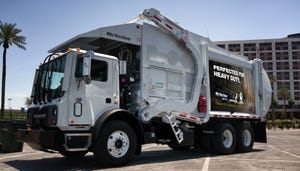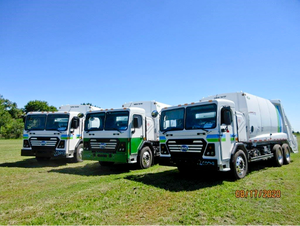Florida Recycling Market Gets Back To Business
September 1, 1996
Michael Ohlsen
Is there a better way to manage commerce than in an actual business environment? This was the rationale used by Florida Governor Lawton Chiles in June 1996, when he signed a bill abolishing the Department of Commerce (DOC) and transferring the state's economic development responsibilities to a public-private enterprise.
As a result, some state agencies are being forced to rethink their operational methods, and recycling officials are pondering the state's role in future recycling market development.
Developing Markets Market development involves creating or expanding markets for recyclable materials which maintain a stable, long-term demand. In the past, most market development has focused simply on increasing end-use manufacturing capacity. Today, state officials have realized that market development must span the entire "recycling loop": from collecting a recyclable, to creating an in-frastructure to convert it into a product, to selling the product profitably.
For instance, bringing additional mills on-line will yield little benefit if the existing collection and processing infrastructure can barely meet the current demand. Stability over the long term requires the uniform development of each link in the recycling loop.
The market development tools available to state agencies take many forms including policy/regulation; technical/specialized business assistance; financial incentives/disincentives; information access and exchange; education; research and demonstration projects; procurement/buy-recycled programs; and marketing.
Florida's Program Since 1988, Florida has provided recycling grants to its counties to the annual tune of $25 million to help jump-start residential recycling programs. The results have been impressive: According to figures reported by each county, the Florida Department of Environmental Protection calculated that the 1995 state-wide recycling rate was approximately 40 percent.
A DOC survey of Florida's recycling industry revealed that more than 13,000 Floridians make recycling their profession and that the private sector has invested nearly $2.7 billion in recycling facilities and equipment.
While these numbers suggest that the local recycling "engine" is revved and the state's "jumper cables" can now be removed, when the Florida Legislature proposed to discontinue the annual recycling grants this past election year, the local recycling coordinators objected and won. Large counties claimed they would have to scale back their public education efforts and thus jeopardize participation rates, while rural counties said they would have to scale back their entire recycling program or eliminate it all together.
The counties realize the money won't keep coming forever, and now the state, as a whole, must consider how best to position itself for the inevitable separation. In the past, Florida's goal was to implement a workable recycling infrastructure. In the future, Florida will strive to support recycling in ways that do not involve direct state funding - a move which will affect market development efforts.
A Winning Strategy Florida's current recycling market development program is a blend of five components: buying recycled, education and outreach, research and development, financial assistance and technical assistance. The program's long-term success relies on those efforts that do not depend on state funding, such as buying recycled products and maintaining a loan program for recycling businesses. With future funds available, emphasis will be placed on research support, development and new recycling markets education.
Starting in October 1996, the state's market development efforts will be coordinated through Florida's Reuse and Recycling Business Assistance Center (RBAC) which is partially funded through the U.S. Environmental Protection Agency's "Jobs Through Recycling" program.
RBAC will sponsor a number of activities, including research projects demonstrating the use of recovered construction and demolition (C&D) debris and organics. Combined, these components currently comprise approximately 45 percent of Florida's waste stream.
Increased Buy Recycled Following the concept of buying products to create markets, Florida agencies purchased nearly $14 million of recycled content paper items last year. Today, more than 500 recycled content products are available on state contracts.
States can encourage recycled products purchasing by eliminating specifications and procedures that discriminate against products or materials manufactured with recovered materials. Building codes and construction standards, for example, can be rewritten to reflect performance specifications that allow recycled materials to be bid while still protecting the public's health, safety and welfare.
While the Florida Department of Management Services (DMS) offers a five to ten percent price preference to state and local agencies on the purchase of recycled content products, the DMS would prefer to specify recycled content wherever possible, thus eliminating any need for price preferences.
A new program receiving attention is the State Negotiated Agreement Price Schedule (SNAPS). With SNAPS, the DMS has streamlined the procurement process for vendors with environmentally-friendly products.
Counties, cities and state agencies can purchase up to $150,000 of a SNAPS vendor's product without bidding. Using the schedule, an agreement can be in place in less than a week.
EduTech Education Solutions, in its first six months with the program, reported $348,853 in sales of its used computer parts. American Tire Recyclers posted $209,905 in crumb rubber sales such as sports turf and playground cover. in the same amount of time. More than 200 SNAPS agreements currently are in force.
The Education Effort Public education is a critical component in market development's success. "Reach for Recycled," sponsored by Palm Beach County's solid waste authority, was a 17-week, multi-media campaign aimed to help consumers recognize products made with recycled materials. Similar campaigns have been successful in municipalities such as King County, Wash., and San Francisco. Since Palm Beach's campaign ended only a few months ago, its results aren't available yet. However, in the first year, recycled product sales in King County increased 58 percent in grocery stores and 27 percent overall.
Another successful public education event, a Buy Recycled Expo, was held in Broward County in April. Partially funded by the DOC, the Expo brought together purchasing agents, recycling coordinators and the public with vendors of recycled-content products. In addition, more than 70 purchasing agents attended a Buy Recycled Training Institute sponsored by the U.S. Conference of Mayors.
The Florida Organics Recyclers Association (FORA), a broad-based, non-profit organization, is hosting a series of workshops on organics recycling throughout the state. These are forums for composting and agricultural experts to discuss new findings and collaborate on solutions to compost applications. The workshop costs are defrayed through registration fees and in-kind donations.
With $1.7 million generated from the now-defunct advanced disposal fee, Keep Florida Beautiful, Inc., Tallahassee, created a statewide television recycling advertising campaign last year to boost public participation. It is expected to continue throughout next year pending additional state funding.
Research and Development The Florida Center for Solid & Hazardous Waste Management, Gainesville, uses the state's university system to coordinate waste management research, training and service activities.
The center has sponsored numerous studies ranging from a "buy recycled" survey to finding new uses for mixed glass cullet.
The survey reported four out of five Florida businesses purchase some recycled content products, but not consistently. To increase demand, the authors concluded it will be necessary to educate businesses further about recycled products.
Currently, the center also is examining new markets for organics and C&D debris.
Expansion Loans The Florida Recycling Development Loan helps expand the state's recycling industry by offering prime rate loans to eligible companies. Approximately $2.4 million is available for the revolving loan program where small businesses can receive up to $200,000 or 40 percent of eligible costs, whichever is less. The loan program's administration costs are covered by the fund's interest.
Pro-Form Technologies, Sarasota, which uses recycled plastics in sport utility vehicle cargo mats, was awarded the first loan in June 1996. It received $85,000 to purchase new molds and other equipment to expand manufacturing and to hire additional staff.
Since then, four more companies have received initial loan approval, which will help further the processing of mixed paper, used oil, wood pallets and plastics within the state.
Advisory Committee Florida's Recycling Markets Advisory Committee (RMAC) serves as a conduit through which local governments and industry can voice issues, concerns and recommendations to state agencies, the governor and legislature.
During the 1996 legislative session, RMAC recommended "equalizing regulatory requirements for C&D processing facilities and C&D landfills in order to develop a level playing field." Subsequently, a statute was created, establishing more appropriate standards for C&D debris landfills such as monitoring groundwater and, in some cases, installing liners and leachate collection systems.
The Florida Department of Environmental Protection is currently working with the C&D community to develop a rule to implement the new law.
Across The Nation Other states continue to explore innovative alternatives to recycling market development as well:
* South Carolina sponsored an Investment Forum for recycling entrepreneurs to meet investors and economic development officials who could assist with financing and business development needs.
* Long Beach, Calif., created Recycling Market Development Zones which offer loans to expanding manufacturers of recycled products located within a zone.
* The National Recycling Coalition, Alexandria, Va., and its Buy Recycled Business Alliance includes more than 2,400 U.S. companies who promote the purchase of recycled content products. The organization provides members with a guidebook and quarterly newsletter that highlights new products and resources.
Florida's Recycling Horizon Development of Florida's recycling industry has been largely a reflection of the state's recycling interest and support. Since 1988, Florida has made great strides toward surpassing a statewide 30 percent recycling goal. In the future, however, local recycling program must become self-sufficient - and market development is a key to reaching that goal.
At the state level, agencies will continue to support the research and development of new markets when funds are available. Over the long haul, the state's greatest contributions will be in the form of consistently buying recycled products; broadcasting new advances in processing technology and emerging markets; and providing loans for the expanded use of recycled materials in existing facilities.
You May Also Like


